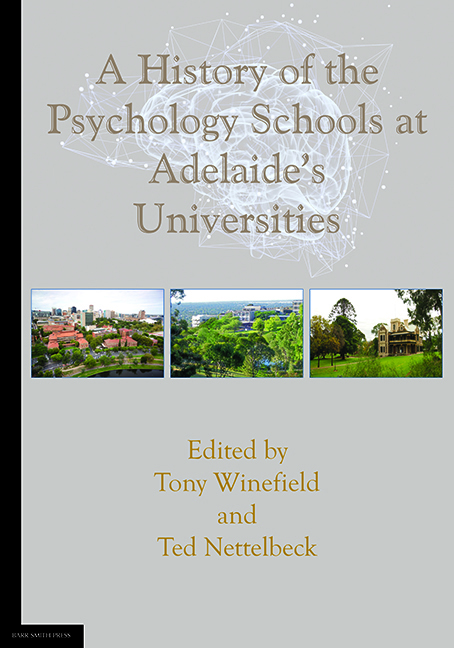Book contents
- Frontmatter
- Contents
- List of contributors
- Preface
- 1 Introduction
- 2 The origins and early history of the University of Adelaide's School of Psychology
- 3 The later years
- 4 Teaching applied psychology at the University of Adelaide: A personal view
- 5 Flinders University: Psychology in the twentieth century
- 6 Recent history of Flinders School of Psychology
- 7 The history of Psychology at the University of South Australia: From little things big things grow
- 8 The history of Psychology at the University of South Australia: Recent history
6 - Recent history of Flinders School of Psychology
Published online by Cambridge University Press: 25 July 2017
- Frontmatter
- Contents
- List of contributors
- Preface
- 1 Introduction
- 2 The origins and early history of the University of Adelaide's School of Psychology
- 3 The later years
- 4 Teaching applied psychology at the University of Adelaide: A personal view
- 5 Flinders University: Psychology in the twentieth century
- 6 Recent history of Flinders School of Psychology
- 7 The history of Psychology at the University of South Australia: From little things big things grow
- 8 The history of Psychology at the University of South Australia: Recent history
Summary
Brief history
Flinders University was established in 1966, and in 1967 teaching of psychology to first-year students commenced, along with the appointment of the foundational chair, Professor Norm Feather. The School (and former Discipline) of Psychology has always been located in the Faculty (formerly School) of Social Sciences. The faculty, renamed the Faculty of Behavioural and Social Sciences from 1 January 2010, includes three other schools (Business, International Studies, and Social and Policy Studies). A snapshot of the historical timeline for the school is presented in Figure 6.1.
Over the last fifteen years, research interests in the school have been united by a cohesive theme: the rigorous application of theory and methodological approaches from basic psychology through to a range of applied issues of relevance to human behaviour across the lifespan: clinical and health, developmental, social, neuroscience and psychophysiology, memory and cognition. Psychological science is a designated area of research strength within Flinders University. Current staff in the school and their respective research interests are shown in Table 6.1.
Research strengths over the last fifteen years
This chapter presents information about the recent research history of the school since 2000. In particular, we highlight the main themes of our externally funded research and its impact.
The Eyewitness Memory Laboratory Neil Brewer and Nathan Weber
The Eyewitness Memory Laboratory was established in the late 1990s by Neil Brewer, and he and former PhD student and current colleague, Nathan Weber, now manage the lab. It has received continuous ARC funding from the late 1990s through to 2019. This funding has included six ARC Discovery Projects led by Neil Brewer and one led by Nathan Weber; one ARC Linkage International Social Science International; and one ARC-LIEF grant, with total funding of around $2.5 million. Neil Brewer and Nathan Weber have also been involved as chief investigators on eyewitness memory projects funded by the ARC, ESRC (UK), NSF (US) and the British Academy, with funding well in excess of $1 million.
Although there has been a diverse array of projects conducted in the lab, the major focus has been in the area of eyewitness identification. The study of eyewitness identification is important because eyewitnesses frequently make mistakes when presented with a line-up.
- Type
- Chapter
- Information
- A History of the Psychology Schools at Adelaide's Universities , pp. 155 - 182Publisher: The University of Adelaide PressPrint publication year: 2016



